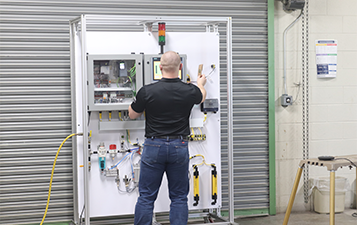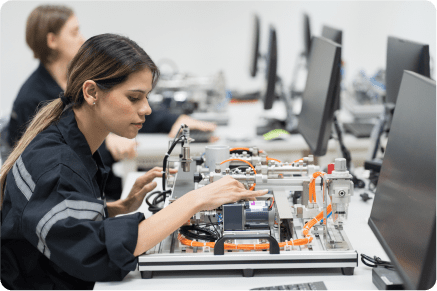Integrating Science, Math, Computers, Electronics Engineering, Management, and Economics.

Hands-on Learning Technology Programs
Classes and Labs Taught by Professors (Not by Teaching Assistants)
>75% of Classes Have Laboratory
EET is a profession that deals with the design, application, installation, manufacturing, operation and maintenance of electrical systems. EET is the largest branch of engineering technology and includes a diverse range of sub-disciplines, such as applied design, electronics, embedded systems, control systems, instrumentation, telecommunications, and power systems. Our EET program includes topics such as robotics, computer-aided design (CAD), programmable logic controllers (PLC’s), and electronic manufacturing processes
The Electrical Engineering Technology program is a full four-year BS degree. Although it is not as mathematically rigorous as the Electrical Engineering program, it does share a few courses with it and is quite rigorous compared to other many similarly titled programs elsewhere. Students in the Electrical Engineering Technology program have the opportunity to use their technical electives to obtain a minor in Robotics Technology, and graduates have excellent job prospects.
Since a typical LSSU Engineering Technology class has about 15 students, you will have the chance to work closely with your instructors, all of whom are full-time faculty members, rather than graduate student assistants. The small class sizes also promote interaction in the lecture and the laboratory with other students and with your instructor.

Recognizing that learning comes through doing as well as listening, the Electrical Engineering Technology program is designed to include a significant amount of practical engineering technology experience. Accordingly, the core of the curriculum contains 15 engineering and engineering technology courses, of which 13 contain a laboratory component. Additionally, nearly all technical elective courses also contain laboratory components. Some courses also include a term design or research project, providing further opportunity to learn through experience.

The core of the Electrical Engineering Technology curriculum emphasizes practical applications such as solid modelling (CAD), digital electronics, computer programming, production control via PLC’s, and basic robotic technology. The technical elective portion of the curriculum also provides the opportunity for additional study in robotics via the Robotics Technology minor.

All LSSU engineering and engineering technology students participate in a senior project. Our senior projects span two semesters during the senior year and are usually sponsored by an industrial customer. A typical senior project team is comprised of four or five students having various engineering and engineering technology majors. The team works directly with their customer to complete the project. Skills such as leadership, team work, financial budgeting, project management, technical writing, presentations, and design reviews are just among the many soft skills that are honed through this experience. It prepares the engineering technology students for a future in industry.Recent graduates of the Electrical Engineering Technology program have worked for Applied Manufacturing Technologies, QComp Technologies, and Esys Automation, to name a few.
Team Automation Controls Engineering (ACE) in conjunction with Team Conveying Automation Systems (CAS) created an educational KUKA robotic platform for students at Lake Superior State University (LSSU).
LSSU engineering alumni are successful and engaged in meaningful careers in both Michigan and internationally. Recent graduates of the electrical engineering program have worked for Tenaris Algoma Tubes, Essar Steel, Pretec, Dematic, Patti Engineering, Exel North America, and Brock Solutions. Others have gone on pursue graduate degrees at institutions such as Michigan State University, Purdue, University of Michigan, University of Dunquerke (France), Michigan Technological University, and Oregon State University.

Technical Areas
Industries

